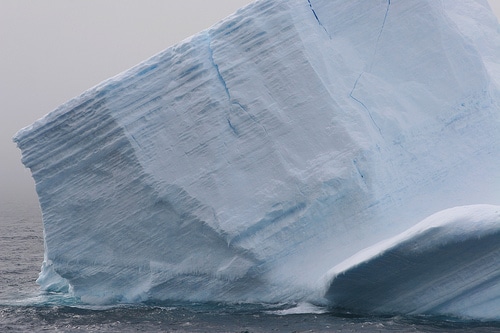Two popular climate skeptic “facts” which are claimed to disprove anthropogenic global warming are:
1. Surface ice melting on Antarctica is decreasing.
2. Sea ice around Antarctica is increasing.
Despite what climate skeptics assert, neither of these arguments disprove global warming. Actually, they highlight quite the contrary: Antarctica is in fact losing mass (ice). Even more, ice is melting and breaking away from the continent at an incredibly accelerating rate.
This isn’t opinion, there is data to prove it.
A recent article published by NASA thoroughly explains why these arguments are misleading. The article also offers multiple streams of scientific data to show how alarming the rate of glacial retreat on Antarctica is.
Data from NASA’s Grace satellite shows that Antarctica is losing 100 cubic kilometers (24 cubic miles) of ice per year. More alarming, still, is the increase in the rate of disintegration. The article points out that ice can flow without melting, which illuminates how moot the skeptics’ first argument is, as well as clarifying the reason behind their second claim.
The majority of the melting of the Antarctic ice sheet is occurring in Western Antarctica. Western Antarctica is a series of islands covered by ice, which NASA describes as a “frozen Hawai’i.” According to data accumulated by NASA’s Jet Propulsion Laboratory, Western Antarctica’s largest ice stream, the Pine Island Glacier is retreating. This year a British scientific group not only verified NASA’s data, but also showed that the retreat of the Pine Island Glacier quadrupled between 1995 and 2006. If this glacier melts, scientists estimate it would raise sea levels by 1.6 to 2.3 feet.
A major reason for the accelerating retreat of Western Antarctica’s glaciers is the warming of the sea water surrounding Antarctica. Warm water is highly problematic for ice shelves. Ice shelves are the portion of a glacier that extends beyond land mass and out into the water. As a result, their intrinsic icy structures are highly vulnerable to warm water–problem number one.
Problem number two: ice shelves act as a buffer wall which slows the flow of ice toward the water. So, eliminating a glacier’s ice shelve is like removing the door from an over-stuffed closet–most of the contents spill out. In the case of Western Antarctica this is a very scary prospect considering if the ice covering Western Antarctica melted, it would raise sea levels 16 to 23 feet. Later this year, NASA will undertake an expedition to rigourously test if Antarctica’s warmer water is undermining its ice shelves.
But, don’t worry, “sea ice around Antarctica is growing,” exclaim climate skeptics.
Yes, because it is spilling forth from the mainland.
The growth of ice surrounding Antarctica reflects a scary global warming trend since it is a result of the Antarctic ice sheet losing mass. And, as Isabella Velicogna of the Jet Propulsion Laboratory and the University of California, Irvine, says, “The important message is that it is not a linear trend. A linear trend means you have the same mass loss every year. The fact that it’s above linear, this is the important idea, that ice loss is increasing with time.”
Subscribe to our newsletter
Stay up to date with DeSmog news and alerts







